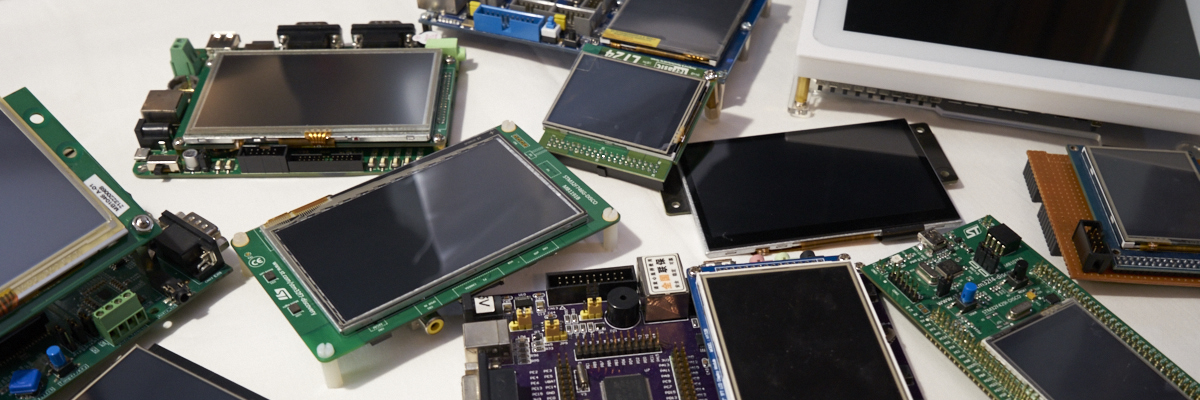-
Posts
2,660 -
Joined
-
Last visited
-
Days Won
2
Content Type
Forums
Store
Downloads
Blogs
Everything posted by Joel Bodenmann
-
Thank you for sharing your driver We'll look into the forum upload issue that you mentioned.
-

I want to register the callback on each window
Joel Bodenmann replied to nicks1980's topic in Support
Have a look at the various GWIN (and widgets) documentation. Especially the /demos directory that comes as part of the library might be a valuable resource. the /demos/modules/gwin and /demos/applications applications will demonstrate the proper use of the event system to dispatch widget events. -
Thank you for bringing this to our attention. We've added looking into this to our ToDo list.
-
There's a list of all supported controllers on the website/homepage. You can also have a look at the /drivers directory. And as @inmarket said: Adding a new driver is very easy. There's documentation and plenty of existing samples including drivers for very similar display controllers.
-
The STM32F103 is quite an outdated microcontroller. Any particular reason why you'd be using this model? µGFX will definitely work in all of those configurations. How much RAM you want to have to work with is of course another discussion (and your personal decision). µGFX can work with very little resources. Having more resources available just enables you to do fancier stuff.
-
Happy to hear that you got it working! The issue with the chip select sounds like the GDISP driver is not properly calling those functions.
-
Hi, We appreciate your motivation to donate. Once we started selling commercial licenses we decided to take down the donation option. Money is clearly the main hold-back issue here as we can't afford more man-power but donations usually don't result in an amount and steady supply of money that would allow to improve this. We're close to release µGFX v2.9. It's already ready - we just need to do the actual release. µGFX v3.0 is also making progress
-
Hello & Welcome to the µGFX community! There are many factors to consider such as the resolution and color space you want. The more pixels you have to control the more resources you'll need (memory, CPU, bandwidth, ...). For something of this size the newer STM32F4 families or the STM32F7/STM32H7 microcontrollers are extremely popular. If you're not very experienced I'd stay away from the STM32H7 for the moment as support for it seems to be quite scarce on all levels (including debugger support). The STM32F7 is by now pretty well established but tends to be a lot harder to work with compared to an "old school" STM32F4 due to newly introduced technologies such as the memory cache which can lead to many sleepless nights: http://www.chibios.org/dokuwiki/doku.php?id=chibios:articles:cortexm7_dma_guide The STM32F429/STM32F439/STM32F469 are extremely well supported and will most likely provide enough resources for what you're after. Also, you can get various development boards for those with displays so you can get yourself familiar with all the software components before you have to mess with custom hardware.
-
The ILIxxxx display controllers are known to suffer from differences across series and revisions. Also, some (chinese) sources love to sell you an ILI9225 as an ILI9220 and so on. Therefore, once you confirmed that the SPI is working correctly, try to grab the initialization code (sequence) from your supplied and plug it into the init() function of the corresponding µGFX driver. Another thing you might want to do is trying to read out the display controllers version register / chip ID. This will tell you exactly what display controller you have and will also confirm that the communication is working well.
-

Mutiple definitions uGFX + Eclipse + STM32L1
Joel Bodenmann replied to tombalabomba's topic in Support
Happens to the best of us -
You should definitely work against the latest master branch of the official git repository (https://git.ugfx.io/ugfx/ugfx).
-
> I am working with a recent git version of ugfx and Chibios 18.2. How recent is recent? There has been a text edit fix two months ago: https://git.ugfx.io/uGFX/uGFX/commit/509fc7501e7bd30b1b314fc0d4838d7cdf6ac621 I'm currently on the road so I can't dive into this right now. But can you reproduce it with the most minimal test case? Eg. using gwinSetText() with a simple string parameter (no runtime buffer stuff) and setting the last argument to TRUE? So I guess the response to your "I suppose using dynamic text could provide a workaround, but I thought I would ask before trying too many things." statement is pretty much: That's exactly what I'd recommend you to try to track down the problem.
-

Mutiple definitions uGFX + Eclipse + STM32L1
Joel Bodenmann replied to tombalabomba's topic in Support
Hmm... the board file template is definitely missing. Thank you for bringing this to our attention. Many of the drivers are community driven and do not originate from the official µGFX developers. We're definitely going to take better care of this in µGFX 3.0. We're thankful for any kind of bug reports and/or patches. Usually a forum post will do - if possible with a patch that we can just apply. Alternatively you can make a pull request on the µGFX git server. It's correct that those functions will actually write data to your display controller (in your case) through your SPI peripheral. Most displays that are in the style of the ILI9225 have a pin called D/C or similar - sometimes it's an additional bit in the SPI frame. That bit will tell the display controller whether the data it's receiving is actual pixel data (write_data()) or commands such as changing the viewport, changing rotation or setting any other kind of register value (write_index()). -

Mutiple definitions uGFX + Eclipse + STM32L1
Joel Bodenmann replied to tombalabomba's topic in Support
I'm currently on the road so I can't easily check, but I'd say it's rather likely that the board file can be found in the /boards directory of the library or in the downloads section of this forum. -
Thank you for bringing this to our attention. We'll fix it ASAP.
-
Are you able to supply a patch (diff)?
-
Thank you for bringing this to our attention! As you mentioned yourself there is the need to clean the widget initialization structure prior to using it. We have updated the example code in the wiki.
-
That sounds like a content-size / timeout related issue. I'll dive into this ASAP.
-
If I understand you correctly the return value of the ioctl() function call is different from your observation. Could you check the value of fb-fix.line-length before passing it to the ioctl() function? Also, I am bit surprised that you mentioned multiple calls to the framebuffer driver initialization. I don't have all the code in my mind but that seems a bit fishy - are you using two displays?
-

Shared Framebuffer for Video Overlay possible?
Joel Bodenmann replied to a topic in Development and Feedback
Sorry for the late reply - not sure how this didn't show up in my notifications list. That's certainly possible. We have several customers who use µGFX for overlays / OSDs. I'd recomment that µGFX provides its own video output that you then mix together / on-top of the video using gstreamer. -
I'm having serious trouble reproducing this - could someone else give it a try?
-
Hello and welcome to the µGFX community! I'd have to check the code to be sure but if I remember correctly the vfnprintg() implementation doesn't support leading zeros at the moment. If that's the case we'd be more than happy if you decide to add support for that.
-
Did you try to debug to figure out where the segmentation fault origins from? It will most likely be due to an issue in the GOS abstraction as everything else is high-level code that builds on top of that.
-
I'll have to look at this when I got a bit more time to understand this properly. However, unless you're in a serious memory shortage I'd recommend you not to destroy & re-create the widgets. Instead, just use gwinShow() and gwinHide() (alternatively gwinSetVisible()) to make the appropriate widget become visible.

